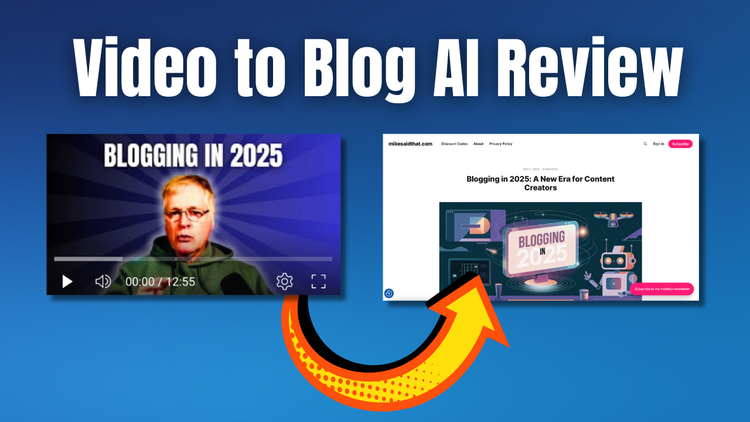Should You Write a Script for Your YouTube Videos? Pros and Cons

Have you ever hit "record" on your camera, only to find yourself stumbling over words, going off-topic, or completely forgetting what you wanted to say? Creating YouTube videos can be a lot of fun, but without a clear plan, it can also be frustrating.
So, should you write a script for your YouTube videos? Whether you’re just starting a YouTube channel or you've been making videos for years, the question of whether to script or not is something that all content creators eventually face.
Some YouTubers love scripting every video to perfection, while others feel more comfortable improvising in front of the camera. There’s no right or wrong way—just the way that works best for you. Let’s dive into the pros and cons of writing a script for your YouTube videos to help you decide which approach is right for you.
What Is a YouTube Video Script?
A YouTube video script is a document that outlines what you plan to say in your video. It’s like a blueprint for your content that helps you stay focused on the key points you want to cover.
Some people prefer to write their scripts word for word, while others just create a loose outline with talking points. The script format can vary depending on the type of video you’re making, but the goal is always the same: to organize your thoughts and make sure you’re delivering a clear message to your viewers.

Pros of Writing a Script for Your YouTube Videos
Keeps You Focused and On Track
One of the biggest benefits of writing a script for your YouTube videos is that it helps you stay on track. When you write a script, you’re planning what you want to say ahead of time.
This helps you avoid rambling and ensures that you hit all the key points you want to cover. If you’ve ever made a video and realized halfway through that you forgot something important, you know how frustrating it can be. A script allows you to plan your content and avoid these kinds of mistakes.
Helps Organize Your Thoughts
Writing a script helps you organize your thoughts and makes sure that your message is clear. Whether you’re creating videos for entertainment, education, or vlogs, your viewers want content that’s easy to follow and engaging. A script helps you outline the main points you want to cover so you don’t miss anything important.
Reduces Nervousness
If you’re new to YouTube or just feel uncomfortable in front of the camera, scripting your videos can be a lifesaver. When you have a script, you don’t have to worry about forgetting what you’re going to say.
You can rehearse your script out loud before you start recording, which can help you feel more comfortable when it’s time to film. For many people, knowing what they’re going to say helps them relax and focus on delivering the content.
Saves Time in Video Editing
One of the lesser-known benefits of writing a script is that it can save you time during video editing. If you know exactly what you’re going to say, you’re less likely to have awkward pauses, filler words, or mistakes that need to be edited out later.
Video editing can be one of the most time-consuming parts of the video production process, so anything that makes it easier is a plus.
Helps With SEO and YouTube Description
Another pro of writing a script is that it makes it easier to create an optimized YouTube description. By having a written version of your content, you can easily pull keywords and phrases that you want to include in your video description.
This can help your video get discovered by more people, and ultimately lead to more viewers subscribing to your channel.

Cons of Writing a Script for Your YouTube Videos
Can Make You Sound Stiff
One of the downsides of scripting your YouTube videos is that it can make you sound unnatural if you’re not careful. Reading a script word for word can come across as robotic, and it might make it harder to connect with your viewers.
If you decide to write a script, it’s important to practice delivering it in a way that feels natural. Try reading your script out loud a few times before filming to help you get comfortable with the flow.
Takes More Time to Prepare
Writing a script takes time. If you’re someone who likes to sit down and just start talking, scripting might feel like an extra step that’s slowing you down. The amount of time it takes to write a script will depend on how detailed you want it to be.
Some YouTubers prefer a simple outline, while others write a complete word-for-word script. If you’re creating new videos every week, scripting every video can become time-consuming.
Limits Spontaneity
Another potential downside of writing a script is that it limits your ability to be spontaneous. Some of the best YouTube moments happen when creators go off-script and share something unexpected.
If you’re too focused on sticking to your script, you might miss out on moments that could make your video more entertaining or relatable. If you like to keep things fresh and unpredictable, a script might feel restrictive.
When Should You Write a Script for Your YouTube Videos?
Educational and Informative Content
If you’re creating educational or informative content, writing a script is a good idea. Videos that cover complex topics or step-by-step guides benefit from a well-thought-out script because it ensures that you’re delivering the information in a clear and logical way.
When you’re explaining something that your viewers need to understand, having a script helps you stay organized and cover all the key points you want to address.
Product Reviews and Tutorials
Product reviews and tutorials are another type of video that can benefit from scripting. When you’re reviewing a product or showing viewers how to use something, it’s important to hit all the main points you want to cover.
A script helps you make sure that you don’t forget anything important, and it can also help you create a clear call to action (CTA) at the end of your video.
Storytelling Videos
Storytelling videos can also benefit from a script, especially if you want to create a great YouTube video that keeps viewers engaged from start to finish. Writing a script allows you to plan out your story and make sure that you’re building suspense or hitting emotional beats in the right places.
Whether you’re sharing a personal story or telling a fictional one, a script can help you organize your thoughts and deliver the story in a way that resonates with your audience.

When You Might Want to Skip the Script
Vlogs and Casual Content
If you’re creating casual content like vlogs, you might not need a script. Many viewers want vlogs to feel authentic and unscripted, so having a word-for-word script might take away from that.
Instead, you can create a loose outline of the main points you want to cover and let the rest happen naturally. This gives you the freedom to be spontaneous while still making sure you stay on track.
Videos Where You Want to Connect Personally with Viewers
If you want to connect with your audience on a personal level, you might find that scripting makes it harder to be genuine. Sometimes, speaking from the heart without a script allows you to be more relatable and authentic.
If you’re comfortable in front of the camera and have a good idea of what you want to say, going unscripted can help you build a stronger connection with your viewers.
Videos That Rely on Humor
Humor is one of those things that can be hard to script. What sounds funny on paper might not always translate well on camera. If your content relies on humor, improvising can make your video feel more natural and help you react to things in the moment.
While you can still plan out some key jokes or talking points, leaving room for improvisation can make your video funnier and more engaging.
How to Write a Script for Your YouTube Video
Start with an Outline
The first step in writing a YouTube video script is to create an outline. An outline helps you organize your thoughts and decide on the key points you want to cover in your video.
Whether you’re making a step-by-step guide, a product review, or a storytelling video, an outline will help you stay focused and make sure you don’t miss anything important.
Write in a Conversational Tone
When writing a script for your YouTube video, it’s important to write in a conversational tone. You don’t want your script to sound like a speech or a lecture. Instead, write as if you’re talking to a friend.
Use simple, everyday language and try to avoid being too formal. This will help you connect with your audience and keep them engaged.
Include a Hook at the Beginning
The beginning of your video is one of the most important parts because it’s when viewers decide whether they’re going to keep watching. Make sure to include a hook at the start of your video that grabs your audience’s attention.
This could be an intriguing question, a surprising fact, or a relatable statement that makes people want to hear more.
Add Clear Call to Actions (CTAs)
Don’t forget to include clear calls to action (CTAs) in your script. Whether you want your viewers to like your video, subscribe to your channel, or leave a comment, it’s important to ask them to take action.
Adding a CTA at the end of your video or after a key point can help you grow your audience and increase engagement.
Practice Reading Your Script Out Loud
Once you’ve written your script, practice reading it out loud. This will help you catch any awkward phrases or sentences that don’t flow well. It will also help you get comfortable with the content so that you sound natural when you’re recording.
If you find that some parts of your script sound stiff, try rephrasing them to make them more conversational.
Keep It Short and Sweet
While it’s important to cover all the key points, you also want to keep your script short and to the point. Viewers have short attention spans, and you don’t want to lose them by going off on tangents. Focus on the main points you want to cover and try to keep your script concise.

Tips for Making Your Script More Engaging
Use Personal Stories
One way to make your script more engaging is to include personal stories. Sharing a personal experience related to the topic can help illustrate your points and make your content more relatable. Viewers love hearing about real-life experiences, and it can help you stand out from other content creators.
Ask Questions
Another way to keep your audience engaged is to ask questions throughout your video. Questions make people think and encourage them to interact with your content. For example, you could ask viewers if they’ve ever experienced something similar to what you’re talking about or if they have any tips of their own to share.
Add Visual Cues to Your Script
If you’re planning to include graphics, images, or text on the screen during your video, make note of it in your script. Visual cues can help illustrate your points and make your video more interesting to watch. This is especially helpful if you’re creating educational or informative content where visuals can help explain complex ideas.
Be Yourself
At the end of the day, the best way to make your script engaging is to be yourself. Don’t be afraid to let your personality shine through in your content. Viewers want to connect with real people, so the more genuine you are, the better. Whether you’re funny, serious, or somewhere in between, just be you.
Conclusion
So, should you write a script for your YouTube videos? It really depends on your content and your personal style. Writing a script can help you stay focused, save time in editing, and ensure that your message is clear. On the other hand, it can also make you sound stiff and take away from the spontaneity that makes some videos so much fun to watch.
Whether you decide to write a complete word-for-word script or just jot down some talking points, the most important thing is to create content that you’re proud of and that keeps your viewers coming back for more. If you’re still on the fence, why not try scripting a few videos and see how it feels? You might find that it’s just what you need to take your YouTube channel to the next level.
Frequently Asked Questions
Here's an extended FAQ for "Should You Write a Script for Your YouTube Videos? Pros and Cons" incorporating the requested terms and format:
Q: Why should I write a YouTube script for my videos?
A: Writing a YouTube script can help you create more structured and engaging videos. It allows you to organize your thoughts, ensure you cover all key points, and maintain a consistent flow. A well-written script can also save time during the editing process and help you create videos that better resonate with your audience.
Q: How do I write a YouTube video script that engages viewers?
A: To write an engaging YouTube script, start by identifying your video's main message and your audience's pain points. Include a strong hook at the beginning, use conversational language, and incorporate storytelling elements. Don't forget to add calls-to-action and include opportunities for viewer interaction. Remember, the goal is to create content that resonates with your subscribers and keeps them watching.
Q: Are there any downsides to scripting my videos?
A: While scripting has many benefits, there are some potential drawbacks. Scripts can sometimes make your delivery sound unnatural or rehearsed if you read them verbatim. They might also limit spontaneity and natural reactions. Additionally, strictly following a script could make it challenging to adapt to unexpected moments during filming or to incorporate impromptu ideas.
Q: Do all successful YouTubers write scripts for their videos?
A: Not all YouTubers write scripts, but many do use some form of scripting or outlining. Some prefer detailed scripts, while others use bullet points or loose outlines. The choice often depends on the type of content, personal preference, and the channel's style. Experimenting with different approaches can help you find what works best for your YouTube channel.
Q: What should I include in my YouTube script template?
A: A good YouTube script template should include sections for your introduction, main content points, transitions, and conclusion. Consider adding placeholders for B-roll footage, graphics, or special effects. Also, include notes on your delivery style, key phrases to emphasize, and any calls-to-action. Remember to leave room for ad placements if you monetize your videos.
Q: How long should a script for a YouTube video be?
A: The length of your script depends on your target video duration. As a general rule, aim for about 120-150 words per minute of video. However, this can vary based on your speaking speed and the complexity of your topic. It's often better to write more than you need and trim down during the editing process to ensure you have enough content.
Q: Can scripting help me create videos faster?
A: Yes, scripting can significantly speed up your video creation process. With a well-prepared script, you'll spend less time figuring out what to say during filming, which can reduce the number of takes needed. Scripts also make the editing process more efficient, as you'll have a clear structure to follow. This can be especially helpful if you're aiming to produce many videos consistently.
Q: How can I make my scripted videos sound more natural?
A: To make scripted videos sound more natural, try these tips: Write in a conversational tone, practice your delivery before filming, allow for some improvisation during recording, and don't be afraid to deviate slightly from the script if it feels right. Remember, the script is a guide, not a strict rule. The more you practice, the more natural your delivery will become, even with a script.



